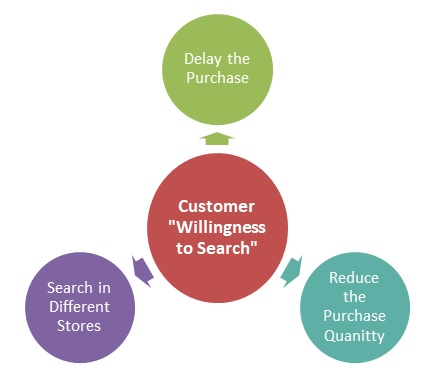- Business Concepts ›
- Marketing and Strategy ›
- Willingness to Search
Willingness to Search
Definition, Importance & Example
This article covers meaning & overview of Willingness to Search from marketing perspective.
What is meant by Willingness to Search?
Willingness to Search is a metric that measures the likelihood that customer will delay the purchase of a particular product, look for it in different stores or reduce the quantity to be purchased in order to avoid purchasing an alternative of this particular product. “Willingness to Search” is one of the metrics that enables companies to measure the customer’s product or brand loyalty.
If we try to summarize in one line, Willingness to Search addresses the question that “If a particular brand or product is not available or available in lesser quantity in a store as required by a customer, that customer will search for that brand or product in different stores, will wait for it to get replenished or he/she will look for its alternative”.
Importance of Willingness to Search
Willingness to Search enables companies to know about the attitudes and commitment of its customer base towards its brand or products. Marketers evaluate customer loyalty through a number of metrics like repurchase rate, willingness to pay a price premium, a share of requirements etc. Willingness to Search is one among them. If the willingness to search is high for a brand/product, the company can generate powerful leverage in trade negotiations.
Also, it provides the company the time to address a competitive threat as customers chose to stay with the brand in such kind of situations.

One point to be noted in it is the willingness to search is how convenient it is for a customer to search for the product/brand he desired and what other alternatives are available for him.
Points to be kept in mind while doing the study:
1. While studying Willingness to Search, demographics have to be kept in mind. For example, older customers have shown to demonstrate higher loyalty rates.
2. Caution to be taken while comparing loyalty rates across products as different products generate different levels of loyalty.
Read More
Advantages of Willingness to Search
1. Willingness to Search enables the companies to measure customer’s brand/company loyalty.
2. Brand recommendation being done by satisfied and influential customers.
3. Emotional benefits and hidden values are effectively communicated through Willingness to Search analysis
4. It enables to assess a strong image for the product, user or usage- experience.
5. It enables to assess a product/brand’s position in the market
Formula of Willingness to Search
Its formula can be defined as:
Willingness to Search (%) = (Number of customers willing to delay the purchase, change stores or purchase a product in lesser quantity / Number of customers who desired this product/brand and were willing to pay for it) * 100
Example of Willingness to Search
10 people visit a grocery store to buy a Real Fruit Juice (1 Litre) pack. Real Fruit Juice (1 Litre) pack recently ran out of stock in this store but 200ml packs of the same juice are available and 1 Litre packs of fruit juices like Tropicana, Paper Boat, Patanjali are available.
3 of these customers went to different stores to look for Real Fruit Juice, 3 of them went on with purchasing 200ml packs of Real Fruit Juice and 4 of them purchased fruit juices of other available brands.
Willingness to Search % in this case = (6/10)*100 = 60%
Hence, this concludes the definition of Willingness to Search along with its overview.
This article has been researched & authored by the Business Concepts Team which comprises of MBA students, management professionals, and industry experts. It has been reviewed & published by the MBA Skool Team. The content on MBA Skool has been created for educational & academic purpose only.
Browse the definition and meaning of more similar terms. The Management Dictionary covers over 1800 business concepts from 5 categories.
Continue Reading:
What is MBA Skool?About Us
MBA Skool is a Knowledge Resource for Management Students, Aspirants & Professionals.
Business Courses
Quizzes & Skills
Quizzes test your expertise in business and Skill tests evaluate your management traits
Related Content
All Business Sections
Write for Us